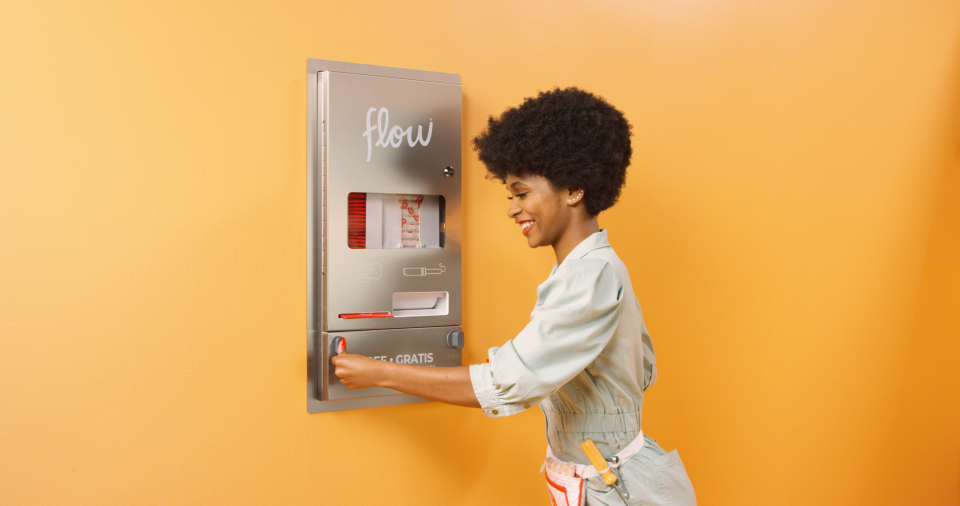Akron-Summit County Public Library adds free period products in restrooms

The Akron-Summit County Public Library has free period products in half of its branches’ restrooms to help address menstrual equity for its visitors, with plans to expand them to all branch restrooms next year.
The library has free organic cotton pads and tampons available in dispensers in its women’s and family restrooms in the main library and its nine branches in Akron. They were installed last month.
Signage is also posted in the men’s restrooms stating products are available in the family restrooms.
The library is planning to add the dispensers in restrooms in its remaining nine county branches outside of Akron next year.
“We started to think about what does it mean to come to the library to take a class, to work on your resume, to try to improve your computer skills, to participate in after-school snack, to come for a concert and have to leave, and what the research shows is that the majority of menstruators have had the situation on more than one occasion where they are caught without supply,” said Barbara White, deputy director of Akron-Summit County Public Library. “And this means they have to leave, and so that creates an inequitable situation in terms of access.
“We don't ever want someone to have to cut short their visit to the library because of this, and we have thousands of visitors a month for whom that is possible,” White said. “And so it really is a matter of kind of preserving that access to everything the library has to offer.”
White said the library system focuses on being inclusive and accessible to all. It’s certified sensory inclusive by Kulture City and is also dementia-inclusive, and the main library has an Accessibility Zone that includes a talking book program and Braille books.
“The library has a very strong commitment to equity and inclusion and access, so we're always thinking about what are the barriers to full participation in library use and participation in the community in general,” she said.
So when the library became aware of the growing menstrual equity movement both in library systems and across the country — including at the Columbus Metropolitan Library and the Bierce Library at the University of Akron — White knew having free period products at Summit County's libraries would be a natural fit.
“By equity, what’s meant is that the inavailability of menstrual product, the idea that this is not as necessary as toilet paper, paper towels, soap in a restroom creates inequity in access to public resources, public spaces, interrupts the school day and really impacts the lives of girls, women, and transgender menstruators just in every aspect of being a participant in your community,” she said.
The startup cost for the Summit County library system was about $6,900, which included 21 dispensers across the 10 locations. But after the library purchases the dispensers for the remaining branches, the only future cost will be for the restocking of the pads and tampons.
The library isn't alone in making such products available for free in Akron. Akron City Council last year approved having them freely available in all city-owned and -operated restrooms, including at City Hall, the Akron Municipal Courthouse, fire and police stations and community centers.
Additionally, Ohio’s state sales tax on menstrual products, called the “tampon tax,” “pink tax” and “period tax,” ended in 2020.
“What we know is that this alone does not address all of the inequity around and all of the stigma around menstruation,” White said. “This is our small effort to make that difference. We hope that it will be a model for others if they get so inspired.”
After Roe v. Wade in Ohio: Physicians worry about ob-gyn training, recruiting, retention with Ohio's new abortion law
Summit County Domestic Relations Court: 'We want to be prepared': Domestic relations court, Victim Assistance outfitting kids' room
Summit County library working with Aunt Flow
The library is working with Aunt Flow, a Columbus-based company, on the initiative. The company provides the dispensers and products.
“After getting my period unexpectedly in public without the supplies I needed, I thought to myself, ‘Toilet paper is offered for free, why aren’t tampons and pads?’ At that moment, ... I knew that I wanted to dedicate my life to ensuring everyone has access to period products,” said Claire Coder, founder and CEO of Aunt Flow, in a statement.
Aunt Flow, which Coder founded in 2016, works to provide the products for free in public restrooms, including businesses and schools, and has worked with organizations including Google, Princeton University and Netflix.
Aunt Flow said it works with more than 900 businesses in all 50 states. In 2021, the company said it stocked more than 5.8 million products and donated more than 1.6 million.
For every 10 period products Aunt Flow sells, the company donates one to nonprofits, with the company noting that such products aren’t covered by food stamps or WIC, the federal Special Supplemental Nutrition Program for Women, Infants and Children.
The company uses the terms “menstruator” instead of “woman” and “period products” instead of “feminine hygiene products” to be more inclusive, noting that “not all women have periods, and not all people with periods are women.”
“Many period products on the market still use gendered language which can alienate transgender and non-binary people,” the company said.
The dispensers compliant with the Americans with Disabilities Act, operated by pushing a button instead of turning a knob, and include English, Spanish, French and Braille, as well as iconography showing tampons and pads.
Aunt Flow also believes in fighting “period poverty,” which is the lack of access to period products and education.

Studies on ‘period poverty,’ access to products
A 2021 study by Kotex, a maker of tampons and pads, found 2 in 5 people have struggled to buy period products, a 35% increase from the brand's initial research in 2018.
According to the study:
• 23% of Black and 24% of Latina people with periods strongly agreed that they've struggled to afford period products in the past year.
• 27% of all respondents said the COVID-19 pandemic made it difficult to access the products, with 65% of those who have struggled stating they lacked access because they could not afford them.
• 38% of low-income women report missing work, school or similar events due to lack of access to period supplies.
Dr. Huma Farid, an obstetrician/gynecologist at Beth Israel Deaconess Medical Center and instructor in obstetrics and gynecology at Harvard Medical School, said in a 2021 article for Harvard Health Publishing, the consumer health education division of Harvard Medical School, that nearly 22 million women who live in poverty in the U.S. can’t afford menstrual hygiene products.
“We need to address stigma around menstruation in order to understand and fix the challenges people face around access to menstrual hygiene products. Period poverty is real. Period equity should be real, too,” she said.
“Embarrassment or taboos may prevent people from advocating for themselves, but if that stigma is removed — or even eased by talking through these issues — we as a society can move forward to address the needs of half of our population. There is no equity when half the population bears the financial and physical distress as a consequence of the reproductive cycle needed to ensure human survival.”
Farid cited a study in the journal Obstetrics & Gynecology reporting that 64% of women reported ever having difficulty affording menstrual products and 21% were unable to afford them every month.
Farid said that using products longer than they should be used can lead to irritation and infection.
Farid also noted that people who are homeless or incarcerated are at “particularly high risk of not having access to adequate menstrual hygiene products.”
“Menstruating is a basic fact of human existence,” she said. “Menstrual hygiene products are necessities, not luxuries, and should be treated as such.”
Contact Beacon Journal reporter Emily Mills at emills@thebeaconjournal.com and on Twitter @EmilyMills818.
This article originally appeared on Akron Beacon Journal: Akron-Summit County Public Library has free period products in restrooms

